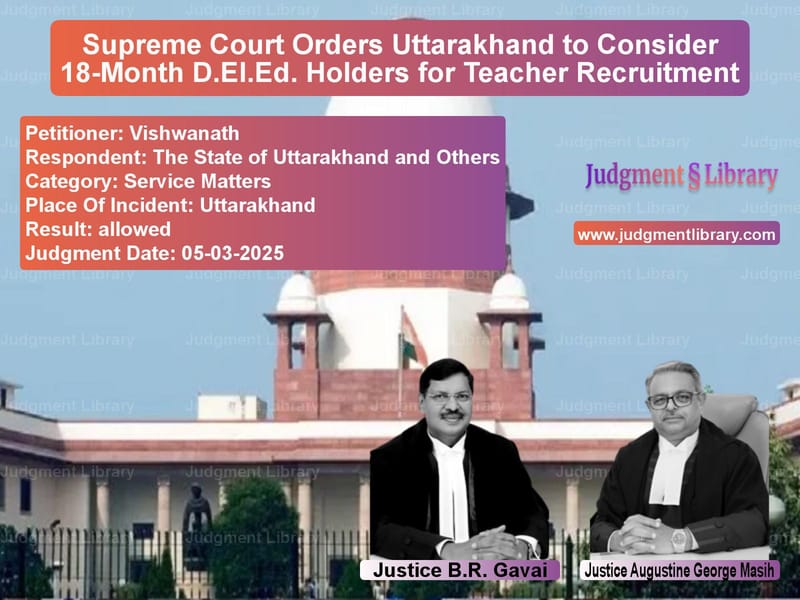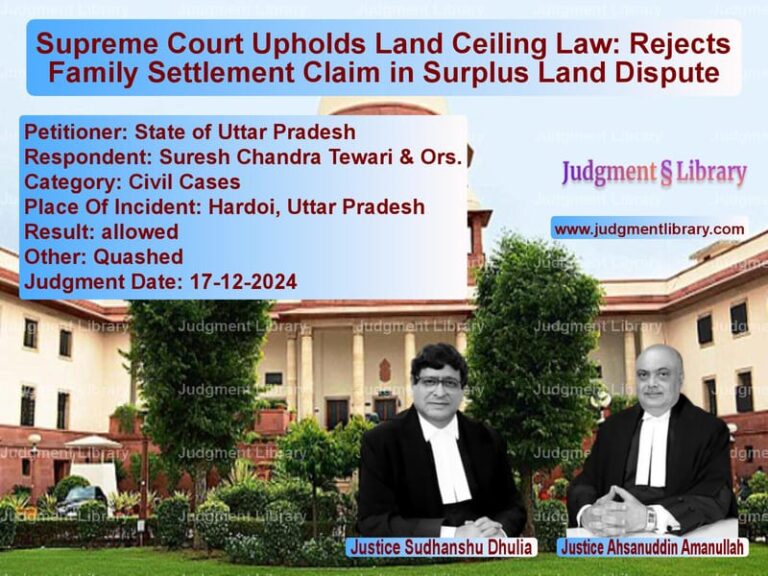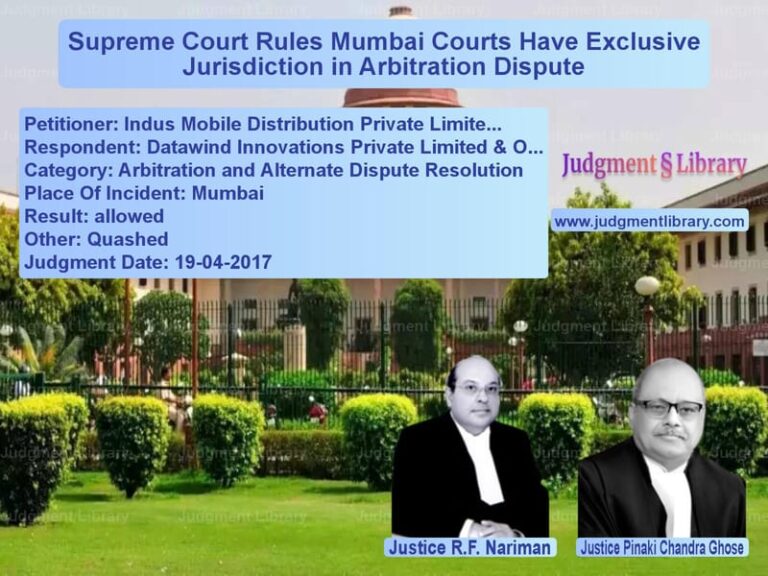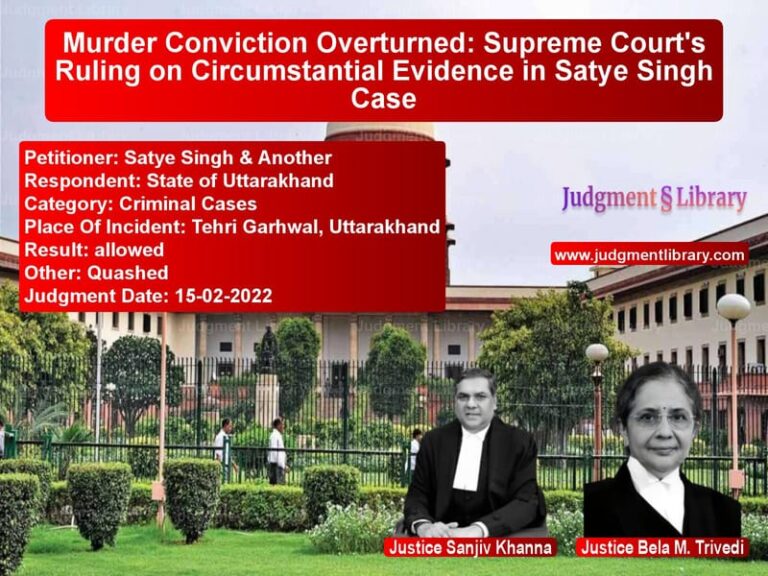Supreme Court Orders Uttarakhand to Consider 18-Month D.El.Ed. Holders for Teacher Recruitment
In a crucial ruling impacting teacher recruitment in Uttarakhand, the Supreme Court of India has directed the state government to consider candidates possessing an 18-month D.El.Ed. qualification obtained through the National Institute of Open Schooling (NIOS) under the Open and Distance Learning (ODL) mode. The judgment, delivered on March 5, 2025, by a bench comprising Justices B.R. Gavai and Augustine George Masih, was in response to a petition filed by Vishwanath, challenging the exclusion of such candidates from the ongoing teacher selection process.
The petition stemmed from a series of policy shifts regarding teacher qualifications under the Right of Children to Free and Compulsory Education Act, 2009 (RTE Act). The Supreme Court clarified that teachers who obtained the diploma while already in service before August 10, 2017, were eligible for appointment. The court observed that despite its prior judgment on November 28, 2023, the State of Uttarakhand continued to deny these candidates a fair opportunity.
Background of the Case
The case has its origins in the 2017 amendment to the RTE Act, which mandated that teachers employed before March 31, 2015, must acquire the required two-year D.El.Ed. diploma within four years. To facilitate compliance, the government authorized an 18-month D.El.Ed. program under NIOS. However, Uttarakhand’s 2012 education rules continued to require a full two-year diploma, leading to the exclusion of these candidates from teacher recruitment processes.
Legal Challenges and High Court Ruling
Initially, the State of Uttarakhand permitted 18-month diploma holders to apply for teaching positions. However, in February 2021, it withdrew this directive, citing a lack of equivalency in its existing rules. This decision was challenged before the Uttarakhand High Court, which ruled in September 2022 that the shorter diploma was valid for teacher recruitment. The High Court found no substantive difference between the two programs and directed the state to allow such candidates to apply.
Following the High Court’s decision, the state government appealed to the Supreme Court, arguing that its recruitment policies should not be altered to accommodate the NIOS diploma holders. On November 28, 2023, the Supreme Court upheld the validity of the state’s 2012 rules but also emphasized that the 18-month diploma was recognized for in-service teachers employed as of August 10, 2017.
Supreme Court’s Final Judgment
Despite the Supreme Court’s clarification, the State of Uttarakhand continued to exclude these candidates, prompting a fresh legal challenge. The petitioners argued that the recruitment advertisement issued on May 29, 2024, did not consider their eligibility, even though they met the court-mandated criteria.
Key Arguments
Petitioner’s Arguments:
The counsel for Vishwanath, senior advocate Gopal Sankaranarayanan, contended that the state was willfully disregarding the court’s previous orders. He submitted an RTI response indicating that 279 posts remained vacant, while only 239 candidates were available. This, he argued, demonstrated that the exclusion of 18-month diploma holders was unjustified and detrimental to educational institutions in Uttarakhand.
He stated, “The respondents have failed to recognize that the clarification issued by this Hon’ble Court categorically stated that such diploma holders must be treated as valid candidates. Their exclusion violates the principles of fairness and natural justice.”
Respondent’s Arguments:
Representing the State of Uttarakhand, counsel Ms. Vanshaja Shukla defended the government’s position, arguing that the 2012 rules were upheld by the Supreme Court and that making an exception would disrupt the recruitment process.
She submitted, “The selection process has been nearly completed. Interfering at this stage would cause unnecessary complications. The government is only following its legally established recruitment criteria.”
Verbal Arguments of the Court
In delivering the final judgment, Justice B.R. Gavai addressed the concerns raised by both parties, reiterating that the court had already clarified the issue in its previous ruling.
He stated, “The intention behind the 18-month diploma program was to ensure that in-service teachers are not unfairly removed from employment. We find that the petitioners, having obtained their qualifications in accordance with the one-time scheme, are fully eligible to apply.”
Justice Augustine George Masih concurred, adding, “We cannot allow bureaucratic rigidity to defeat the legislative intent of the RTE Act. The state is bound by our clarification and must process these applications without delay.”
Final Court Directive
The Supreme Court, in its order, directed the State of Uttarakhand to process the applications of eligible 18-month diploma holders within three months. However, it also emphasized that the existing selection process would not be reopened, ensuring that candidates already selected would not be affected.
Justice Gavai clarified, “We are not directing a fresh recruitment process. We are only ensuring that eligible candidates, as defined by this court, are not unjustly excluded.”
With this ruling, thousands of teachers previously barred from applying will now have the opportunity to participate in the recruitment process.
Petitioner Name: Vishwanath.Respondent Name: The State of Uttarakhand and Others.Judgment By: Justice B.R. Gavai, Justice Augustine George Masih.Place Of Incident: Uttarakhand.Judgment Date: 05-03-2025.
Don’t miss out on the full details! Download the complete judgment in PDF format below and gain valuable insights instantly!
Download Judgment: vishwanath-vs-the-state-of-uttarak-supreme-court-of-india-judgment-dated-05-03-2025.pdf
Directly Download Judgment: Directly download this Judgment
See all petitions in Recruitment Policies
See all petitions in Public Sector Employees
See all petitions in Employment Disputes
See all petitions in Judgment by B R Gavai
See all petitions in Judgment by Augustine George Masih
See all petitions in allowed
See all petitions in supreme court of India judgments March 2025
See all petitions in 2025 judgments
See all posts in Service Matters Category
See all allowed petitions in Service Matters Category
See all Dismissed petitions in Service Matters Category
See all partially allowed petitions in Service Matters Category







